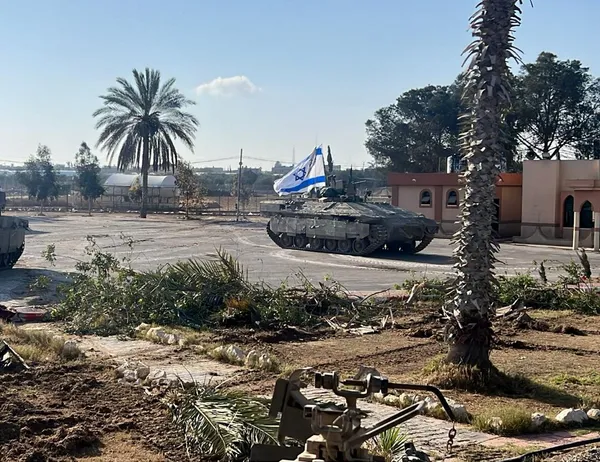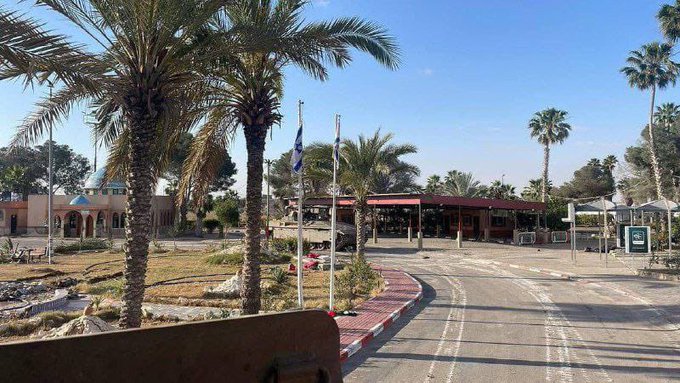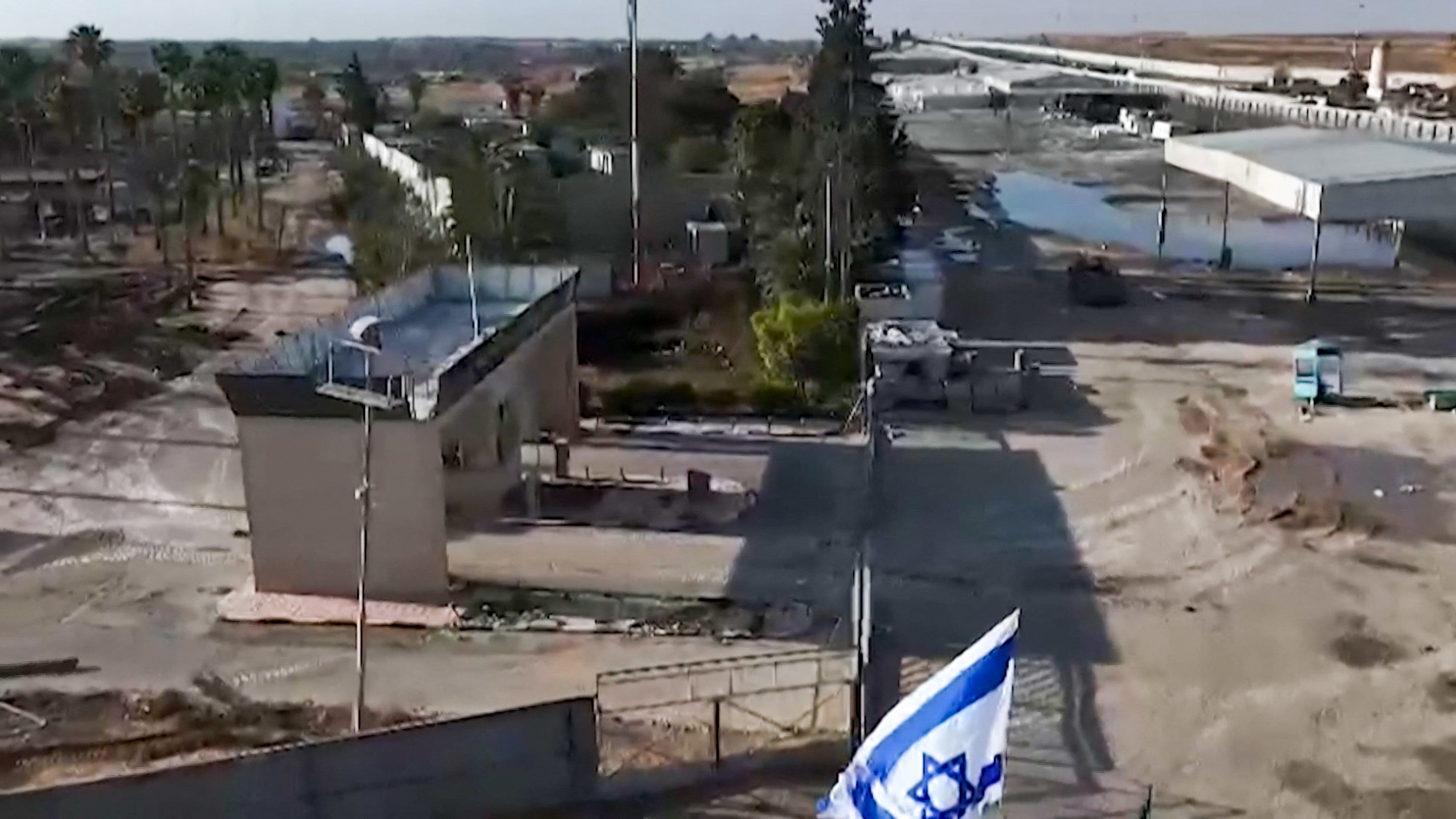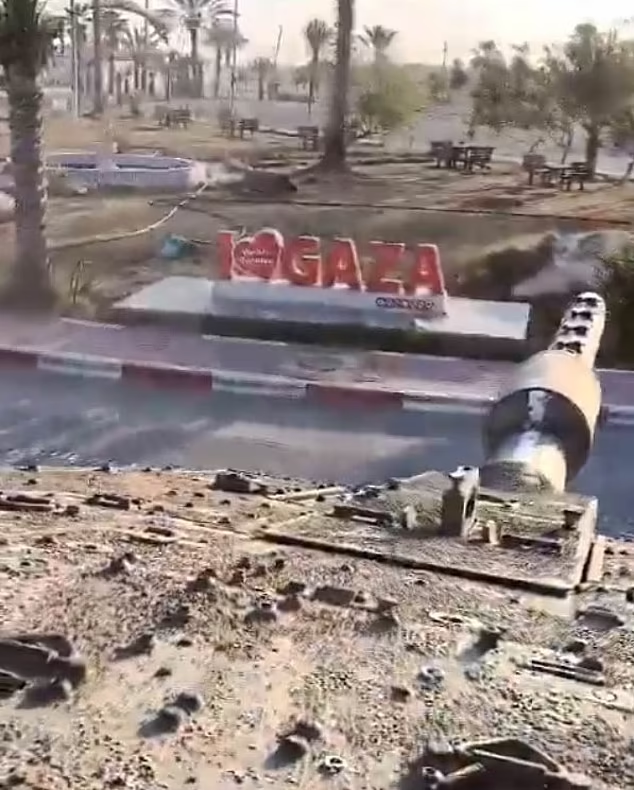Complicity or Weakness? Implications of Israeli Storming of Rafah Crossing and Occupying the Egyptian Borders

The Israeli control of Rafah represents "an indirect threat to Egypt that undermines the Egyptian-Israeli peace agreement."
Following the scandalous silence regarding Ethiopia's threat to Egypt's national security by constructing and filling the Renaissance Dam and controlling the waters of the Nile, Egyptians woke up on May 7, 2024, to another disaster: Israeli occupation of the Palestinian side of the Rafah Crossing, blatantly disregarding the Camp David Accords.
Israeli tanks occupied the Egyptian borders, killing scores of Palestinians, seizing control of the crossing and the Philadelphi Corridor (Salah al-Din Corridor), and raising Israeli flags, amid suspicious complicity from the Egyptian regime under the regime of Abdel Fattah el-Sisi.
Sisi's red lines collapsed one after another, first to Ethiopia and then to "Israel," as Egyptian army statements vanished unexpectedly, amidst the rise of strange entities and militias claiming to act on behalf of Egypt, such as the Union of Arab Tribes.
Israeli invasion of the Rafah Crossing from the Palestinian side and its occupation and bombardment of the Philadelphi Corridor, just 50 meters from Egypt's border with Gaza, clearly violated the peace treaty signed with Egypt in 1979, according to observers and legal experts.
It was also a clear violation of the security annex of the Philadelphi Agreement in 2005 and the Crossing Agreement of 2005, and most importantly, a violation of Egyptian sovereignty. Despite this, the Egyptian reaction was peculiar, raising questions about whether it was complicity or weakness.
The statement from the Egyptian Ministry of Foreign Affairs, which commented on the invasion of Rafah, spoke as if Egypt was unconcerned about Israeli tanks standing on its borders, or the breach of the peace agreement, as if it were a banana republic indifferent to what was happening and demanding "Israel" to exercise restraint.
The statement condemned the invasion as threatening to refugees, obstructing aid, and a prisoner swap deal, but did not utter a word about the threat to Egyptian sovereignty and national security or the breach of the peace agreement.
What Happened?
Although political analysts and military experts agree that what happened was an attempt by Israeli Prime Minister Benjamin Netanyahu and his army to capture a "victory photo" near the Egyptian border before concluding a ceasefire agreement with Hamas, they considered the incident a dangerous precedent.
A correspondent for the newspaper Yedioth Ahronoth said that the Israeli army's raid in Rafah was "limited and focused," involving only two brigades: Givati and 401.
Yoav Zitun explained that "the goal was symbolic and was filmed well to show the crossing of the border with Egypt, which was seized without much resistance," and the Americans were informed.
Analysts have suggested that Netanyahu had three objectives with the Rafah operation: to showcase his strength, appease extremists in his government, and fulfill his long-standing promise of a victory. However, what unfolded was a humiliating blow to Egypt's dignity and sovereignty. It openly challenged Egypt before the entire world, demonstrating superiority over Egyptian borders, amidst the silence of the Egyptian military and the head of the Egyptian regime Abdel Fattah el-Sisi, who had previously drawn fictitious red lines.
Israeli soldiers deliberately posted pictures atop tanks, adorned with Israeli flags, along the Egyptian–Palestinian borders, as if sending a challenge not to Hamas, but to Egypt, which remained silent.
According to Israeli and Palestinian media, Israeli tanks breached the Philadelphi Corridor, reaching Rafah Crossing amidst bombardment, penetrated the crossing, and allegedly killed 20 employees, claiming they were Hamas fighters.
Israeli media confirmed the control of the 162nd Brigade along with the 401st Brigade and Givati Brigade over Rafah Crossing, publishing footage of Israeli tanks damaging the crossing's infrastructure.
Images and videos intentionally circulated by the Israeli Occupation forces showcased the presence of Israeli military vehicles inside the crossing, following intense bombardment, during which travel and aid deliveries were halted.
Amos Harel, a military analyst at Haaretz newspaper, on May 7, 2024, suggested that the Israeli army's occupation of the Palestinian side of Rafah Crossing and the Philadelphi Corridor was linked to negotiations on the deal.
He explained that following Hamas's approval of the deal, there were political claims within "Israel" that Egyptians and Americans had reached understandings with Hamas behind Israeli Occupation's back. This was based on modifications to the Egyptian proposal that "Israel" had positively responded to about two weeks prior.
Harel believed that Netanyahu's announcement of sending a working team to negotiators was not a high-level one, but rather a preliminary indication of his intention to reject the proposal following Hamas's positive response.
He added that the likelihood of progress in negotiations on the deal remained slim, but it was possible that Hamas leaders, with their positive response, had influenced relations between "Israel" and the United States.
Indicators of Complicity
Following Israeli threats to storm the Rafah crossing, William Burns, the director of the U.S. Central Intelligence Agency (CIA), visited and stayed for several days under the banner of discussing the ceasefire agreement in Gaza. However, Egyptian observers speculated that the discussion also included arrangements for Israeli entry into Rafah in search of a victorious image.
Twenty-four hours before the Israeli Occupation forces stormed the Rafah crossing and amidst rumors of its closure and travel suspension, Egyptian authorities deliberately affirmed through media outlets that "the crossing had not been closed and any claims of its closure were mere fabrications and lies."
However, the irony lies in the fact that "Egypt closed the Rafah crossing with cement and prevented entry and exit since May 6," as confirmed by Yedioth Ahronoth newspaper on May 7, 2024.
The newspaper published photos it claimed to be of the closure of the Rafah crossing from the Egyptian side with concrete blocks by Egyptian authorities.
Additionally, the Israeli army radio mentioned that "Israeli officials informed Egypt of the commencement of the invasion hours before the raid on Rafah," amidst official and media silence from Egypt.
Egypt contented itself with issuing a statement from the Ministry of Foreign Affairs on May 7, 2024, "condemning the Israeli military operations in the Palestinian city of Rafah and its control over the Palestinian side of the Rafah crossing," but did not consider it a violation of Egypt's sovereignty or the peace agreement.
What's even more bizarre is that Egypt called on "the Israeli side to exercise maximum restraint and refrain from a brinkmanship policy with far-reaching implications that could jeopardize the fate of the strenuous efforts to achieve a sustainable ceasefire in the Gaza Strip."
It urged "all influential international parties to intervene and exert the necessary pressure to defuse the current crisis and allow diplomatic efforts to achieve the desired results."
While awaiting the Egyptian response, Egyptian authorities' committees contented themselves with urging Egyptians to be patient, keep calm, and "have confidence in the leadership."
They affirmed that "Egypt is a strong state and has been prepared for all scenarios for months, and the Egyptian leadership is extremely wise and intelligent, and the armed forces are fully capable."
It was ironic that Egyptian political science professor Tarek Fahmy, close to circles of power and working in an intelligence research center, confirmed that "Egypt is intensifying its contacts at the moment to urge the Israeli side to withdraw from the Palestinian side of the Rafah crossing!"
He acknowledged that Israeli control "threatens the peace treaty between Egypt and Israel."
However, he told Alhurra website that Egypt seeks understanding with the Israeli side so that the presence of Israeli forces is limited to a specific area in eastern Rafah, and not to expand the military operation in the southern city.
However, Egyptian military and strategic expert Major General Sameer Farag told the American website that Israeli control over Rafah is akin to a non-direct threat to Egypt and affects the Egyptian–Israeli peace agreement.
He described the incursion as "harassment of Egyptian territory," but did not mention how Egypt would respond or the reason for the silence of Sisi and the army.
"Sisi traitor and agent" hashtag spread in Egypt, with people asking: Where did Sisi's statements go about the Philadelphi Corridor being a red line and a threat to national security?!
Palestinians and Egyptians were puzzled by the silence of the graves from the Sisi regime and the world over what happened, estimating that moving military units in this border area violates the peace agreement.
They said this means one of two things: either this incursion was coordinated with the Egyptian side, or it was done through a blatant violation of the agreement signed between the two parties, which requires a decisive and resolute Egyptian response to preserve its sovereignty, something that has not happened.
Sirt and Jufra cities were 1000 kilometers away from Egypt's western border, but Sisi considered them a "red line" and threatened to invade and bomb Libya, claiming they are part of Egyptian national security, but he did not consider the entry of Israeli Occupation tanks just, 43 meters away, a red line.

Four Proofs
Four pieces of evidence, as monitored by Al-Estiklal, indicate Egyptian–Israeli–American alignment regarding the onset of this attack on Rafah as follows:
Firstly, Egypt's explicit announcement of its approval of the military operation in Rafah in statements made by Foreign Minister Sameh Shoukry to CNN on April 16, 2024.
In response to a question about the Israeli attack and what Egypt would do if Palestinians fled toward Egypt's borders for safety and the possibility of Egypt opening its doors to Palestinian refugees, Shoukry stated that Egypt would handle the displacement of Gaza residents appropriately and humanely, and the method by which this will be done will depend on the circumstances.
Secondly, Ibrahim al-Arajani Company's announcement of the completion of a new buffer zone on the borders of Rafah, where Palestinian sources revealed Egypt's completion of the construction of a buffer zone adjacent to the borders with Gaza, connected to a scenario of displacing Palestinians outside the Strip, in case the Israeli Occupation launches a ground attack on Rafah city.
The Sinai Foundation for Human Rights disclosed on February 14, 2024, Egypt's initiation of building the buffer zone, stating that it is surrounded by walls with the aim of receiving refugees from Gaza, in case a scenario of their displacement ensues following a ground invasion of Rafah city.
It was reported that the construction work was carried out by local companies behind the scenes, commissioned by the Sons of Sinai construction company, owned by businessman close to the authority, Ibrahim al-Arajani, clarifying that the buffer zone would be surrounded by walls 7 meters high; thirdly, the confirmation by Egyptian and Palestinian sources of the arrival of 500 Palestinian military personnel affiliated with Palestinian Intelligence Director Majed Faraj to the buffer zone.
Palestinian sources have outlined three primary responsibilities for this security force. Firstly, they are tasked with overseeing the buffer security zone, particularly monitoring movements of Palestinians exiting Gaza into this zone, in coordination with Egyptian authorities. Secondly, they are responsible for supervising the distribution of humanitarian aid to those in need within Gaza.; lastly, they are to manage security personnel associated with the Palestinian authority, facilitating their assumption of administrative control over Rafah Crossing.

Al-Estiklal revealed details of "foiling the conspiracy and how the infiltration of Abbas's intelligence into Gaza showed Hamas's strength."
Israeli Channel 14 confirmed on March 12, 2024, the movements of Majed Faraj to build an armed force in southern Gaza, and that "Israel is in talks with the Palestinian Authority to accept responsibility for the distribution of aid in the Gaza Strip and the consequences of the war."
The Yedioth Ahronoth newspaper on March 14, 2024, spoke about "details of a plan prepared by the Israeli security establishment, approved by the head of the Palestinian Authority's intelligence agency, Majed Faraj, involving the deployment of thousands of Fatah movement members in Gaza."
Fourthly, American newspapers confirmed that Washington coordinated with "Israel" the ground attack on Rafah and would participate in lawsuits to prevent the killing of thousands of residents, and that the construction of the land port on the sea aims to displace those who want to.
Politico magazine revealed on March 28, 2024, that Egyptian officials have put forward a large number of requests to the United States during negotiations regarding the war in Gaza.
It explained that Egypt requested funding and security equipment, indicating that the Sisi regime may seek to benefit from Israeli invasion of Rafah according to the newspaper.
The report of the Israeli Institute for National Security Studies (INNS), issued on December 6, 2023, prepared by three Zionist researchers, revealed six points of Egyptian–Israeli alignment in the post-Operation al-Aqsa Flood phase.
These included disarming the Gaza Strip and weakening Hamas specifically, establishing a political system in Gaza that satisfies both "Israel" and Egypt; coordination between Egypt and "Israel" to weaken the resistance axis as much as possible, and ensuring that Egypt is the primary mediator in any future problems between "Israel" and Gaza; cooperation to expand the base of Arab-Israeli normalization through regional arrangements, and providing economic assistance to Egypt including: exemption from a certain percentage of Egypt's debt, and encouraging foreign investment in Sinai in energy, tourism, and water sectors.

Empty Threats
Since "Israel" announced its intention to occupy the Rafah Crossing and the Philadelphi Corridor, Egypt has issued several statements, mostly from the Egypt State Information Service, threatening a strong response.
The strongest of these was on January 22, 2024, when Egypt stated, "Any Israeli move toward occupying Philadelphi Corridor in the Gaza Strip will pose a serious and grave threat to Egyptian–Israeli relations."
In a statement issued by Diaa Rashwan, Egyptian journalist, politician, and the current chairman of the State Information Service, in response to statements by Israeli officials, including Netanyahu, Egypt stated that "any Israeli move in this direction will pose a serious and grave threat to Egyptian–Israeli relations."
Cairo threatened that it was "capable of defending its interests, sovereignty over its land, and borders," and demanded "the Israeli side to demonstrate its respect for the peace treaty."
Rashwan's statement addressed the red lines set by Sisi that were all rescinded, stating, "This Egyptian red line (non-interference with the Philadelphi Corridor) joins its predecessors, which Egypt has repeatedly announced, including the categorical rejection of forcibly or voluntarily displacing our Palestinian brothers to Sinai."
On January 10, 2024, Israeli Channel 12 reported that Cairo rejected a request from "Tel Aviv" for "Israel" to secure the Philadelphi Corridor area between Egypt and the Gaza Strip.
Rashwan reiterated the threat on February 22, 2024, during a phone call with Al-Jazeera, stating that "if Israel occupies the Philadelphi Corridor, Egypt reserves all its rights to defend its security," without specifying how!
Responding to a question about Egypt's stance if "Israel" were to occupy the Philadelphi Corridor, he said that "Egypt reserves all the rights afforded to it by international law regarding breaches of agreements and its right to defend national security."
Before the Israeli invasion of Rafah by 24 hours, the Egyptian Parliament stressed that the peace agreement between Egypt and "Israel" does not allow the latter to move within the Philadelphi Corridor, stressing that Egyptian national security is a red line.
Major General Ahmed al-Awadi, chairman of the Defence and National Security Committee in the House of Representatives, said that Egypt has a president who will not compromise when it comes to protecting national security, and the Palestinian issue will remain in our hearts and a top priority, according to Middle East Monitor (MEM).
Al-Awadi added that the peace agreement signed between Cairo and "Tel Aviv" does not allow "Israel" to move within the border area between the Gaza Strip and Egypt, especially within the Philadelphi Corridor, except with Egypt's approval. He stressed that Egypt will not, under any circumstances, allow the Israeli army to enter unauthorized areas according to the terms of the peace agreement.
He stressed Egypt's keenness to maintain peace so as not to drag the region into another conflict, adding that the two-state solution is the best option to end the current war on Gaza and "establish a Palestinian state with East Jerusalem as its capital."
The Philadelphi Corridor or Salah al-Din Corridor is located on a strip along the border between Egypt and the Gaza Strip and is part of Zone D, demilitarized according to the peace agreement signed by Egypt and "Israel" in 1979.
On December 30, 2024, Israeli Prime Minister Benjamin Netanyahu said that the Philadelphi Corridor should be "in Israeli hands," indicating that this is the only way to ensure combating smuggling and depriving the Gaza Strip of weapons.
About two weeks later, he repeated the request, stating on January 13, 2024, that Israeli control over the sector is one of the possibilities for what he calls the southern wall.
In early January 2024, the Wall Street Journal reported that "Israel" had informed Egypt of plans for a military operation to regain control of the Philadelphi Corridor.

The Peace Treaty signed between Egypt and Israeli Occupation in 1979, known as the Camp David Accords, stipulates an demilitarized zone along the border, commonly referred to as the Philadelphi Corridor.
This corridor extends from the Mediterranean Sea to the Kerem Shalom Crossing along the Egyptian–Palestinian border, which is 14 kilometers long.
With the withdrawal of the Israeli Occupation from the Gaza Strip, supervision of the corridor and the Rafah Crossing was transferred to the Palestinian Authority, with observers from the European Union, under what is known as the Crossing Agreement.
In September 2005, following Israeli withdrawal from Gaza, Egypt signed an agreement, the Philadelphi Accord, allowing for the presence of Egyptian forces (750 soldiers) with light weapons in the area to provide security, prevent infiltration, smuggling, and terrorism through the Rafah Crossing.
The agreement consists of 83 articles detailing the commitments of Egypt and "Israel" regarding the border areas vacated by "Israel" in 2005, clarifying the tasks, composition, equipment, and armament of the Egyptian forces, as well as their role.
The essence of the Philadelphi Accord is for both parties to bear the responsibility for combating hostile activities related to smuggling, infiltration, and terrorism from the territories of either state. However, it practically assigned the Egyptian forces to perform the same tasks as the Israeli Occupation forces in the blockade of Gaza before their withdrawal.
Under the Philadelphi Accord, the Israeli government transferred control of the Philadelphi Corridor to the Palestinian Authority, and the Palestinian side of the Rafah Crossing was opened in November 2005, under joint Palestinian–Egyptian administration alongside observers from the European Union.
This continued until Hamas took control of the authority in Gaza in 2007 and expelled the Palestinian Authority. Amendments were made to the Philadelphi Accord on July 16, 2007, adding new provisions and understandings to tighten the blockade on Gaza, most of which were kept secret.
Egypt and Gaza share a 14-kilometer border strip known as the "Philadelphi Corridor / Salah al-Din," which "Israel" was responsible for securing until its unilateral withdrawal from the Gaza Strip in 2005, known as the "Disengagement."
Sources
- Egypt: Any Israeli move to occupy the Philadelphia Corridor is a “threat to relations” [Arabic]
- Egypt Parliament: peace deal does not allow Israel to move within Philadelphi Corridor
- Head of Parliament's Defense: Israel's invasion of the Palestinian city of Rafah violates the peace agreement [Arabic]
- Will Egypt open its doors to the Palestinians if Israel invades Rafah? Sameh Shoukry explains to CNN [Arabic]








